
by Sophie Walker (UK) | Oct 27, 2014 | Africa, Journalism, Media, News, Priorities, Sophie Walker, UK
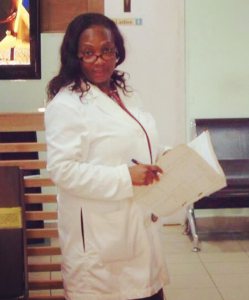 Do you know who Dr Stella Ameyo Adadevoh is?
Do you know who Dr Stella Ameyo Adadevoh is?
Don’t worry. I hadn’t heard of her until just a day or two ago.
When I read about her, my first thought was how wonderful she was. My second was how glad I was of the opportunity to find out about her. My third: what a strange week of news.
It’s largely thanks to Dr Stella Ameyo Adadevoh that the World Health Organisation was able to announce recently that Nigeria – that chaotic, corruption-riddled country – was free of Ebola, the deadly virus currently killing thousands across west Africa in the worst outbreak of the disease known so far.
Dr Adadevoh was the doctor who took care of Patrick Sawyer. Sawyer was the Liberian man who brought Ebola to Nigeria. Nigeria had never had a case of Ebola before. Sawyer denied having had any contact with Ebola, despite his sister dying of the disease. He fought to get out of the hospital. His employers fought to have him discharged.
Adadevoh not only diagnosed a disease previously unseen in her country, but she resisted huge pressure to let it go, according to accounts from the doctors who worked with her.
She quarantined Sawyer – no small task, given his violent attempt to flee – “He pulled his intravenous (tubes) and spilled blood everywhere”, said one witness. She rebutted accusations from the Liberian ambassador that she had kidnapped Sawyer. She contacted the authorities, and she got hospital staff the training and materials they needed to treat Sawyer safely.
Sadly Adadevoh herself contracted the virus and died on August 19, one of eight deaths in Nigeria from Ebola. Not long afterwards the Nigerian government released its National Honours list for this year. Adadevoh was not on it because, as a government spokesman explained, the awards are never given posthumously.
I’ve seen two stories this week about Dr Stella Adadevoh. She did a great thing, and died for it, and too few people noticed.
In contrast, I’ve seen at least twenty-two stories this week about Rene Zellweger, an actress who changed her face and prompted acres – and acres – of media coverage.
I have nothing against Zellweger. Indeed, I have a degree of (angry) sympathy. I recognise the pressure on actresses over forty who are looking for work.
But what a strange week of news, when a woman who has done so much was unseen by so many, and another woman was not just seen but ripped apart for being far too visible.
I’m a journalist by trade. I accept that much of this disparity is down to skewed ideas among major media outlets of what makes news.
But we too – by we I mean us women – bear a responsibility for the way in which women’s lives and achievements are reported. Too often we read and comment on the scandalous stories. Too often we’re boosting the click rates and thus telling those media outlets that yes we are interested in reading this stuff. We are perpetuating the myth that it’s ok to pass judgment on other women purely because of the way they look. We are contributing to the noise around the non-stories that is stopping us from hearing the real ones.
I want to read about more Stellas. Don’t you?
This is an original post to World Moms Blog by Sophie Walker of the United Kingdom.

Writer, mother, runner: Sophie works for an international news agency and has written about economics, politics, trade, war, diplomacy and finance from datelines as diverse as Paris, Washington, Hong Kong, Kabul, Baghdad and Islamabad. She now lives in London with her husband, two daughters and two step-sons.
Sophie's elder daughter Grace was diagnosed with Asperger Syndrome several years ago. Grace is a bright, artistic girl who nonetheless struggles to fit into a world she often finds hard to understand. Sophie and Grace have come across great kindness but more often been shocked by how little people know and understand about autism and by how difficult it is to get Grace the help she needs.
Sophie writes about Grace’s daily challenges, and those of the grueling training regimes she sets herself to run long-distance events in order to raise awareness and funds for Britain’s National Autistic Society so that Grace and children like her can blossom. Her book "Grace Under Pressure: Going The Distance as an Asperger's Mum" was published by Little, Brown (Piatkus) in 2012. Her blog is called Grace Under Pressure.
More Posts

by World Moms Blog | Oct 22, 2014 | 2014, Africa, Awareness, Being Thankful, Caring, Casting a Wider Net, Communication, Economy, Education, Girls, Government, Guest Post, Helping, Human Rights, Humanitarian, Humanity, Inspirational, International, Life, Loss of Child, Media, Motherhood, Nigeria, Older Children, Poverty, Prejudice, Relationships, Safety, School, Social Equality, Terrorism, Tragedy, Women's Rights, Working Mother, World Mom Feature, World Motherhood, World Voice
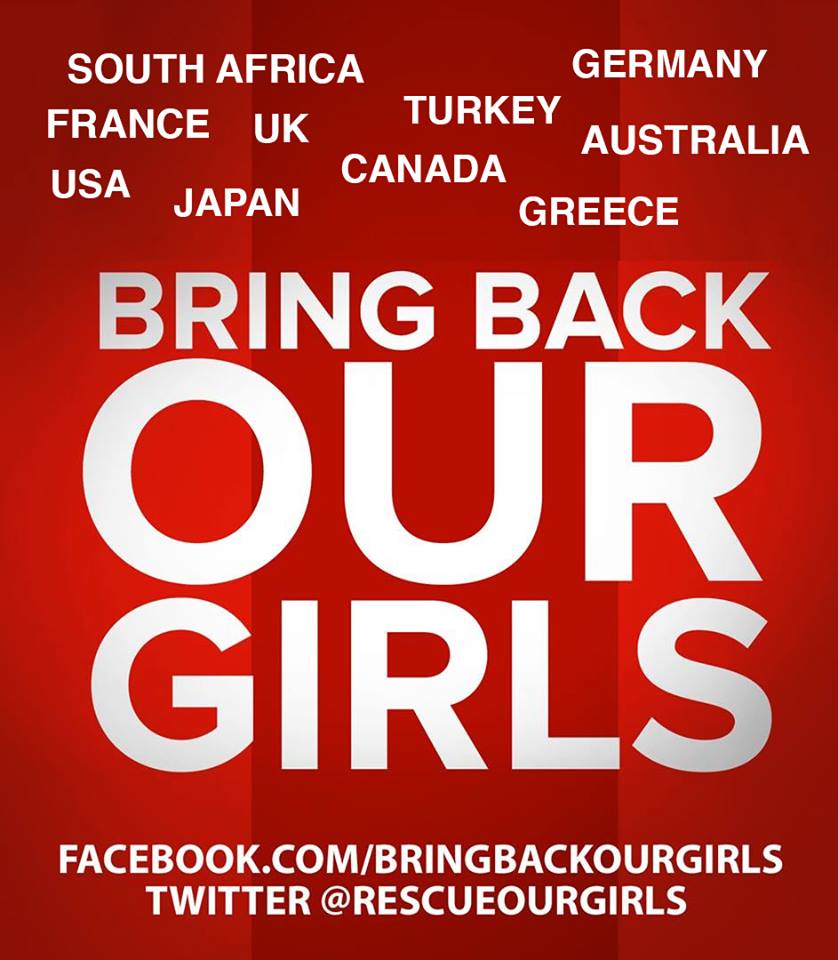 “My daughter said she was going to go to school so that she can wipe away my tears. How is she wiping my tears away in the den of the terrorists?”
“My daughter said she was going to go to school so that she can wipe away my tears. How is she wiping my tears away in the den of the terrorists?”
-mother of one of the #ChibokGirls, abducted on April 14th, 2014, speaking on Day 188 of their abduction -October 19th, 2014
As I looked at her I realized that all this woman’s hopes and aspirations rest on her daughter. For most of the poor people in this part of the world, children are like a source of pension; they are the ones that will help you in the future. They are the ones that will take care of you in your old age, when you are unable to look after yourself. They represent life. As I looked at her I also realized that her daughter means more to her than I can ever imagine. Her daughter is her everything. A source of hope.
These parents are ready to give their lives for their children to have an education. That was what the #ChibokParents did. Amidst the insecurity in Nigeria, they still wanted their children to be educated to better their positions in life. They knew the only way to break the shackles of poverty was through education. For daring to send their children to school to have a better life, instead they have been punished.
These children grow up to not only take care of their parents but siblings as well so that a generation of people who have survived the shackles of poverty would emerge.
For some, poverty is going to school in the morning without breakfast and returning home not expecting lunch but still striving everyday to be in school so that one day you will look back and say I SURVIVED (I AM A SURVIVOR).
I remember one of the fathers at one of our Sit Ins for the #BringbackOurGirls campaign—which started on April 30th with a protest demanding for the rescue of #ChibokGirls—saying he does not have a Television. All he has is a Radio from which he gets to hear of our activities. I wept! In this day of iPads, Tablets, iPhones and what have you, someone does not have a simple television that most of us take for granted.
So now you can begin to understand that to the #ChibokParents these girls are much more than daughters, they are future benefactors
A lot of parents, especially mothers, are forced to live a life of servitude and poverty in order for their children to be educated. The education that is taken for granted in most developed countries is not so in Nigeria and many other African countries.
I remember growing up and how my parents had to struggle to make sure we were educated. We often had to go without food when the situation grew dire but never were my school fees unpaid. I remember my father trekking long distance to buy a textbook I needed badly because the money was not enough for him to pay for a bus. All the suffering was for the children to be able to break the vicious cycle of poverty and one day to be able to take care of ourselves and also take care of our parents and siblings.
A lot of parents invest all they have in their children. For those who are poor, they do not have cars, houses or any investments. All they have are their children. Can you imagine these children being abducted, as is the case with the #ChibokGirls, abducted from school, where they wanted to get an education and make life better for themselves and their families? When these children of the poor are abducted and taken away, the future of a whole generation also is taken away.
As I looked at the woman with tears streaming down her face, all I could see was my own mum, who had to be the head-of-household, who worked all day and night to ensure I had an education. I look back to the days when there was no food to be eaten and yet we found our way to school. I thought of what a burden it must have been for my parents to get us educated, to sacrifice all that they had.
While some of my parent’s contemporaries were busy enjoying life in the way they could with what they had, my parents tightened their belt to make sure that we, their children, had an education and of course today we are their pension. If any of us had been abducted while seeking an education, where would we be today?
As I stood watching the Chibok mother, all I could think about was my mother struggling to give her children the life she did not have and how hard she worked to provide that for us. I thought of my mother, now living in the lap of luxury because she worked so hard four sake. As I stood looking at the Chibok Mother, I realized she too must be allowed to break the shackles of poverty. She too must live in comfort, as her daughter promised her. Her tears must be wiped away. As I stood looking at her I realized that I cannot stop demanding for the rescue of the #ChibokGirls, for that Chibok mother who has given her all, hoping that one day her tears would be wiped away.
I realized that I must demand the rescue of the Chibok girls.We all must.
Demanding the safe return of the Chibok girls to me is like making a demand for the ME that was 23 years ago. As I stood I realized that no matter how hard it gets, no matter how much we are intimidated and harassed, no matter the threat of arrest from our government, I cannot afford to give up on the #ChibokGirls.
To give up on the #ChibokGirls is to give up on myself (the WHO that I have become) and to give up on the mother with tears streaming down her face, waiting for her daughter, who promised to wipe away her tears.
This is an original, Guest Post for World Moms Blog from our sister in Nigeria and mother of two, Aisha Yesufu.
Aisha Yesufu was born in Kano, Nigeria. When she turned 40, in December 2013, she decided it was time to devote her life fully to the services of others. As she describes it,
‘The first 40 years of my life I devoted to myself, so I could be financially independent and help others. But they say: you can’t help the poor by being poor yourself, so the next 40 years, God willing, I am going to devote to others; for me, a full life will be based on what positive differences I have made in the life of another.”
And in came the unfortunate tragedy of the abduction of the #ChibokGirls. Following their abduction, on April 14th 2014, Aisha joined a group of like minded people to demand the rescue of the 219 school girls, who still today remain in the hands of the terrorists. These girls, between the ages of 16 to 18, were abducted from their school, in their quest for knowledge. The group known as the #Bring Back Our Girls campaign has been able to push the issue of their rescue in public discussion both locally and internationally.
Aisha is the coordinator of the daily Sit In for the #BringBackOurGirls campaign group. The group has, without fail, come out daily since the 30th of April, 2014, despite all forms of intimidations and harassment by sponsored persons.
To get involved in the conversation and learn more about the plight of the 219 Nigerian School Girls, visit: #BringBackOurGilrs
World Moms Blog is an award winning website which writes from over 30 countries on the topics of motherhood, culture, human rights and social good. Over 70 international contributors share their stories from around the globe, bonded by the common thread of motherhood and wanting a better world for their children.
World Moms Blog was listed by Forbes Woman as one of the "Best 100 Websites for Women 2012 & 2013" and also called a "must read" by the NY Times Motherlode in 2013. Our Senior Editor in India, Purnima Ramakrishnan, was awarded the BlogHer International Activist Award in 2013.
More Posts

by World Moms Blog | Sep 17, 2014 | 2014, Guest Post, South Africa, World Motherhood
Today we welcome a guest post from South Africa! Karien Potgieter is a full-time working mom of two kids aged two and under. She loves nothing more than to load up the double jogging stroller and set off on adventures with Little Miss K and Baby J – together they dream of running the world! You can follow their adventures at www.runningtherace.co.za. Here, she introduces us to what she calls, “Planet Parenthood”. It’s a hoot! Read on…
Becoming a parent for the first time is a bit like entering a whole new universe. For nine long months little old ladies scare you with old wives’ tales; complete strangers feel enticed to make unwanted comments about your body shape; and discussions with your caregiver border on TMI. But no-one tells you about Planet Parenthood – it’s one of the best-kept secrets of humanity.
A parent’s first encounter with Planet Parenthood happens even before the birth of an offspring. Whether you have a natural home- or hospital birth, or a C-Section, you’ll quickly find that there is no such thing as dignity in your new galaxy. What was once considered to be, ahem, private business, isall of a sudden out in the open for entire medical teams to see. And the weirdest thing about it? No one bats an eyelid. Not even you, because meeting your bundle of joy is way more important. Welcome to parenthood.
The second sign that you now find yourself in a new solar system, is the fact that sleeping, which was once regarded asbeing vital to performing your daily tasks with gusto, is all of a sudden optional.
Who wants to sleep when you can party around a crib all night anyway? And don’t let the fact that others, who are not from the planet of parents, intimidate you with their well-rested physiques and bushy-tailed appearances – looking fresh is way overrated anyway.
But those are just your initial weeks on Planet Parenthood. It gets way, way more interesting than that. Squeamish? You’ll soon get over it. Because there is no such thing as being prissy about bodily fluids on Planet P – everything goes. In fact, everything goes all over you! Gone are your days of going to the shops without boogies on your sleeve. Or in your hair. Or organic pumpkin puree artistically smeared all over your shoulder. It’s your new normal – and you’re okay with it.
Strings and strings of hard-earned tertiary qualifications are furthermore also of zero relevance on your new planet. Because instead of having hoity-toity discussions with others about the nation’s contribution to global warming, or the pros and cons of fracking the Karoo, the majority of your conversations for the next three or four years will revolve around Pajanimals. And Telly Tubbies. And the risks involved with sitting too close to the sofa’s edge. And what will perhaps surprise you the most, is that you will actuallystart looking forward to your daily dose of Shaun the Sheep. And Justin’s House. Don’t you even try to fight it.
Perhaps the reason why everyone is so hush-hush about PlanetParenthood is the fact that it grows on you.
After the initial shock that comes with finding yourself in completely foreign surroundings, you find yourself adapting. And growing. And liking it more and more. Until suddenly, one day, you realise that you don’t want to live anywhere else. Viva Planet Parenthood!
This is a guest post from South African writer, Karien Potgieter of www.runningtherace.co.za.
Photo credit to the author.
World Moms Blog is an award winning website which writes from over 30 countries on the topics of motherhood, culture, human rights and social good. Over 70 international contributors share their stories from around the globe, bonded by the common thread of motherhood and wanting a better world for their children.
World Moms Blog was listed by Forbes Woman as one of the "Best 100 Websites for Women 2012 & 2013" and also called a "must read" by the NY Times Motherlode in 2013. Our Senior Editor in India, Purnima Ramakrishnan, was awarded the BlogHer International Activist Award in 2013.
More Posts

by Alison Fraser | Sep 9, 2014 | 2014, Africa, Canada, Education, Eye on Culture, Girls, Human Rights, Humanitarian, Humanity, Life Lesson, ONE, Poverty, Social Good, Tanzania, Uncategorized
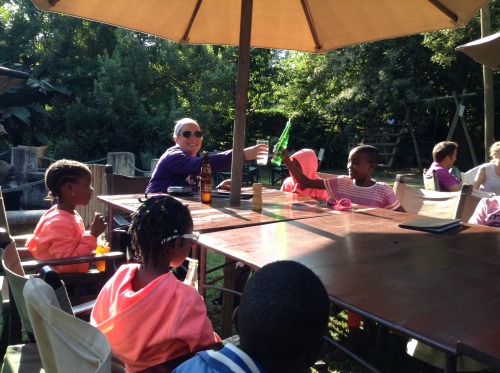
Two months ago, I travelled back to Arusha, Tanzania as part of my work with Mom2Mom Africa. Each time I am in Arusha, I make sure to stop by a local outdoor restaurant frequented by many tourists. The restaurant resides on a beautiful piece of property, and offers free Wifi to connect back home to loved ones. I consider this to be a real luxury in the areas I work in Arusha so take full advantage of this establishment whenever possible.
On my last trip, I decided that I would take several of our Mom2Mom Africa students to this restaurant as a “treat”. What was originally planned as a small group outing with 5 or 6 children, ended up turning into a van full of children, and my colleague Aloyce. It was absolutely priceless to see me walk through the grounds followed by 12 little Tanzanian children, and Aloyce at the rear to ensure we didn’t lose any along the way! The other restaurant patrons could not stop staring!
I had questioned this dinner outing for days before making a decision to go ahead with it. Many believe that exposing those in poverty-stricken areas of the world, to ‘luxuries’ is unjust; a tease. I didn’t want to be that white foreigner.
But, after much thought, I decided to go ahead with our big dinner date. What influenced my final decision was the fact that the same holds true for my three little girls in Canada. As a mother, I often treat my girls to little extravagances. These are not every day occurrences, and in fact are more rare than common. And my girls understand that. If they could be treated each and every day, there would be no argument on their part. But, they know that even though that might be the reality of other little girls their age, it is not their reality. And they are ok with that and simply choose to enjoy the times that they do get to experience trips or dinner at fancy restaurants. I used this experience with my girls as the deciding factor in Tanzania. After all, everyone likes to be treated!
Seeing the kids eat pizza until their bellies were full, drinking pop, and laughing with their friends was one of the highlights of my time in Tanzania. When they noticed the playground with swings and teeter-totters, I lost them in play for 2 hours! They were beyond happy. And, that made me beyond happy. And, at that point, I thought to myself that I had made the right decision. I left the restaurant on cloud nine, with twelve happy little ones singing all the way home in the van.
All had gone as planned, until one little girl said out loud in the van…”I now know how mzungus (white people) live”…and my heart broke.
The restaurant is staffed with locals but caters to tourists, most of whom are white. Instead of this being a fun night out for all, Canadians and Tanzanians alike, the take home message was that white people deserve and live in a world of luxuries. My plan back-fired on me with a vengeance. It has been two months since that night, and that little voice from the back of the van still haunts me. I guess my mommy instinct was off this time. We all worry about making decisions that may negatively affect our own children’s lives. I now worry constantly about my decisions and how they may impact the lives of so many who call me “Mama Alison” in Tanzania.
Do you think it’s better to know what you are missing or not?
This is an original post written for World Moms Blog by Alison Fraser. Photo by Alison Fraser.
Alison Fraser is the mother of three young girls ranging in age from 5 to 9 years old. She lives with her family in Cambridge, Ontario, Canada. Alison works as an Environmental Toxicologist with a human environment consulting company and is an active member of the Society of Environmental Toxicology and Chemistry (SETAC). She is also the founder and director of the Canadian Not for Profit Organization, Mom2Mom Africa, which serves to fund the school fees of children and young women in rural Tanzania. Recently recognized and awarded a "Women of Waterloo Region" award, Alison is very involved in charitable events within her community including Christmas Toy and School Backpack Drives for the local foodbank.
More Posts - Website
Follow Me:



by Nicole Melancon (USA) | Sep 2, 2014 | Africa, AIDS, Human Rights, Social Good, Third Eye Mom, World Voice
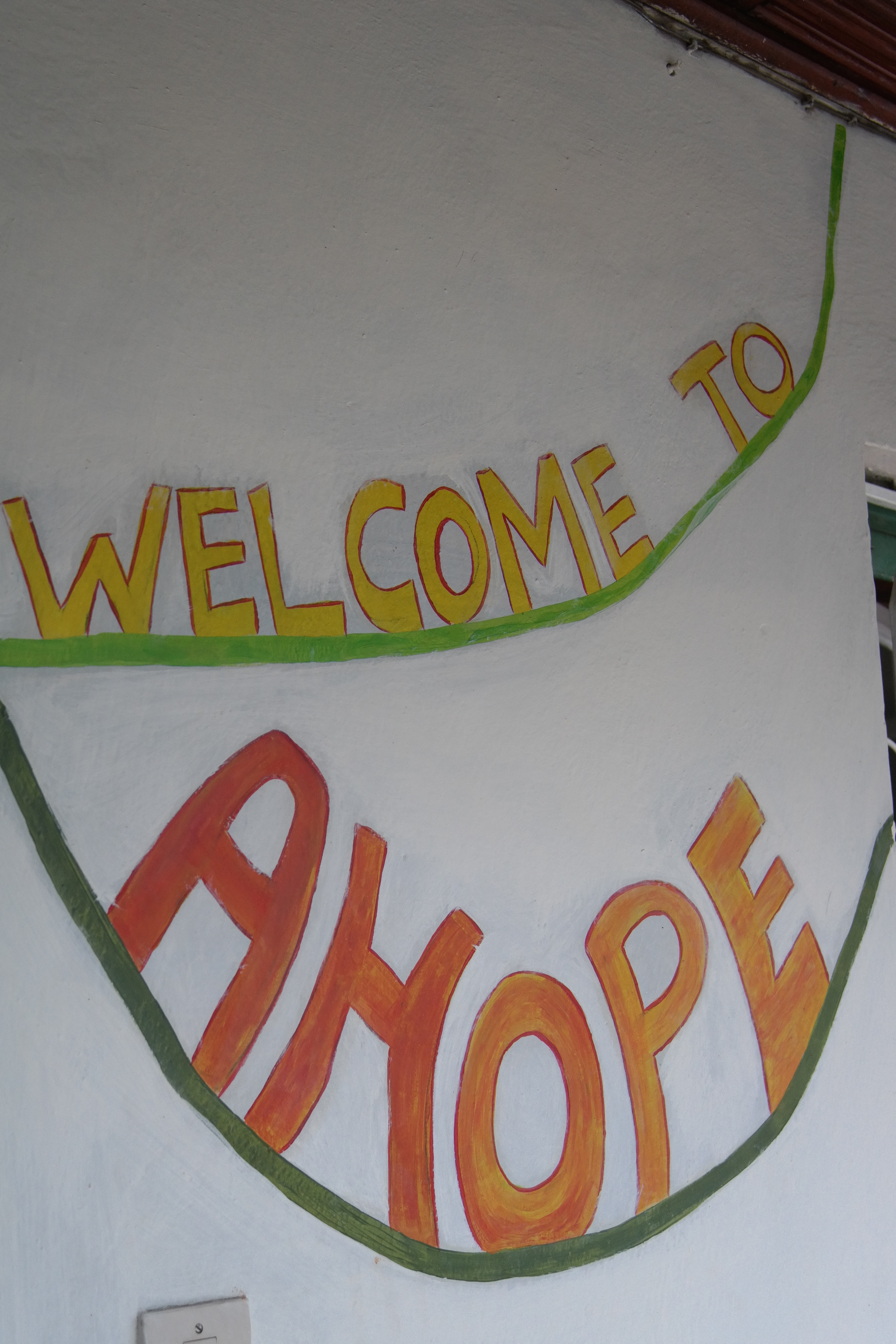 It was a late afternoon in June when Elizabeth Atalay and I, both fellows in Ethiopia with the International Reporting Project, arrived at the nondescript gates of AHOPE for Children on the outskirts of Addis Ababa. The clouds had yet to open up and lash out in their daily angry downpour. But we knew it was coming soon for it was rainy season in Ethiopia.
It was a late afternoon in June when Elizabeth Atalay and I, both fellows in Ethiopia with the International Reporting Project, arrived at the nondescript gates of AHOPE for Children on the outskirts of Addis Ababa. The clouds had yet to open up and lash out in their daily angry downpour. But we knew it was coming soon for it was rainy season in Ethiopia.
I had anticipated this meeting for a long time and was a bit nervous about the world I’d see behind those gates. I had heard about AHOPE for Children after reading the powerful true story of Haregewoin Teferra, a middle class Ethiopia woman who dared to help the growing number of abandoned and orphaned children at the height of the HIV/AIDS epidemic in her country. Award-wining journalist Melissa Fay Greene’s book, “There is No Me Without You” opened my eyes and my heart to the difficult lives of orphaned HIV-positive children and now Elizabeth and I were going to meet some of them.
The impact of HIV/AIDS in Ethiopia is nothing short of heartbreaking. It were statistics like these below that inspired Greene to research the plight of HIV/AIDS orphans in Ethiopia and let the tragedy be known.
Per the United Nations, in 2000 Africa was “a continent of orphans.” HIV and acquired AIDS had killed more than 21 million people, including 4 million children. More than 13 million children had been orphaned, 12 million of them in Sub-Saharan Africa. 25% of those lived in 2 countries: Nigeria and Ethiopia. In Ethiopia, 11% of the children were orphans.
Reading the heart-wrentching stories of the children in Greene’s book left me feeling awfully sad. Yet towards the end of her book, in 2005, the plight of adults and children impacted by HIV/AIDS in Ethiopia and the rest of the developing world changed. Antri-retrovirals (ARVs) which had been widely available in the Western, wealthiest world, had now become available in poorer countries like Ethiopia. The meaning of being HIV positive changed from being a death sentence to a hope to live.
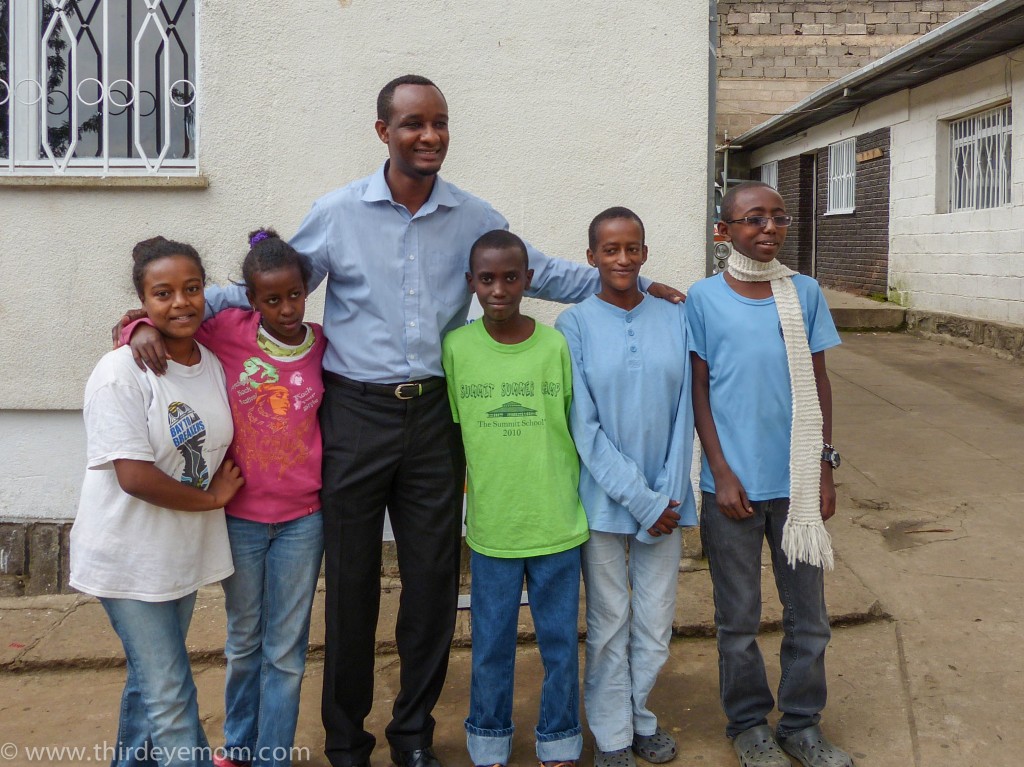
Mengesha, the Director of AHOPE Ethiopia with some of the children.
AHOPE for Children was founded over ten years ago by American Kathy Olsen as an American non-profit charity to assist in the funding of a home for HIV positive children in Ethiopia. AHOPE stands for “African HIV Orphans: Project Embrace” and is the only orphanage in Ethiopia that solely cares for HIV positive children. AHOPE for Children and AHOPE Ethiopia are two separate organizations (AHOPE is based in the US and AHOPE Ethiopia is an Ethiopian non-profit organization) working together to help children with HIV/AIDS. The role of AHOPE for Children is to raise money to support AHOPE Ethiopia; AHOPE Ethiopia is the day to day caring and programs for all of the kids.
AHOPE Ethiopia runs children’s homes, Little AHOPE for younger children, Family Group Homes for older kids, Youth Transition Homes for young adults, and community outreach programs for children impacted by HIV/AIDS. The sole mission of AHOPE is to provide these children with a loving, supportive “family” and prepare them for an independent future while also providing care for HIV.
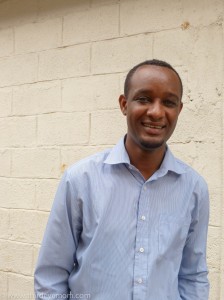
Mengesha, AHOPE Ethiopia’s Director smiles for the camera.
Elizabeth and I met with Mengesha, the Director of AHOPE Ethiopia, at the Little AHOPE compound which is home to 27 children. Currently there are 95 children in AHOPE Ethiopia homes and over 100 children receiving support through AHOPE’s community outreach program.
We entered Little AHOPE to the sounds of children playing outside and were met by several smiles and giggles perhaps a reaction to our blond hair and light skin. At first glance, these children didn’t seem any different than our own. They were playing, singing, jumping and vying for our attention. Yet each one of these children were different as they are all HIV positive, fighting other related illnesses and orphaned.
Our first hour at AHOPE was spent speaking with Mengesha, who has worked at AHOPE for several years and has recently become AHOPE Ethiopia’s Director. Mengesha is a warm, loving man who is passionate about AHOPE and the children. Most of the children at AHOPE are either single or double orphans who have tragically watched one or more parent die from AIDS and has been abandoned with no family member willing or able to care for them. These children have the extra burden of being HIV positive meaning they have many special needs.
AHOPE has a loving, fully trained staff of nurses, pediatricians, care-givers and social workers who ensure each child gets the individual attention, love and care they need. AHOPE aims to provide the children with a sense of belonging to a family and as the children grow, they transition to Family Group Homes. The Family Group Homes are community-based homes run by a “mother” and “auntie” where the kids are integrated into the community. The children attend school, receive their necessary medications, go on field trips and do almost everything else a healthy child would do. Once a child becomes an adult, they move to a Youth Transition Home that prepares 18-24 year olds with independent living.
After Mengesha concluded his overview on AHOPE, it was time for a tour of the home and to meet the children. At first the children were a little bit shy around us however their shyness quickly disappeared as soon as Elizabeth took out her Polaroid camera. The children loved having their photos taken and printed out for them to keep, right before their eyes! Elizabeth was very busy as a queue had formed of excited kids wanting their turn behind the camera.
Meanwhile I got to talk with some of the children and learn about their hopes and dreams. Many of the children had high hopes for their future and all of them wanted to make something out of their life. One teenager said she dreamed of becoming a doctor and helping care for kids like her. HIV positive. Another young boy dreamed of being a teacher. Thankfully, with AHOPE these children all have a hope for the future and an opportunity to be who they want to be.
Some facts on HIV/AIDS and Ethiopia:
▪ An estimated 33.3 million people worldwide are infected with HIV/AIDS.
▪ In 2009, 1.8 million people died due to HIV/AIDS, and another 2.6 mil-lion were newly infected.
▪ More than 68 percent (approximately 22.5 million people) of those infected are in sub-Saharan Africa.
▪ Worldwide, 2.5 million children under 15 are living with HIV/AIDS, and 370,000 were newly infected in 2009.
These are just some of the staggering statistics on the global HIV/AIDS pandemic.
Estimates indicate that in 2009 in Ethiopia approximately 1.1 million people were living with HIV, with a prevalence rate of about 2.3 percent.
Children in Ethiopia are also profoundly affected by HIV/AIDS. In 2009, nearly 73,000 children under age 15 were living with HIV.
Source: AHOPE for Children
Interested in learning more? Here are some excellent resources:
▪ AHOPE for Children’s website
▪ “There is No Me Without You: One Woman’s Odyssey to Rescue her Country’s Children” by Melissa Fay Greene (This book not only tells the true story of Haregewoin Teferra, it also documents some of the believed scientific origins of AIDS, the development and distribution of ARVs, and the plight of AIDS orphans in Ethiopia. It is an excellent book).
▪ A fascinating documentary that can be watched for free over the internet: “And the Band Played On” again documents the discovery of AIDS, the appallingly delayed reaction to do anything, the development of ARVs and the spread of AIDS throughout the world to become one of the worst epidemics Africa has ever seen.
Author Nicole Melancon was in Ethiopia in June as a reporting fellow with the International Reporting Project.

Third Eye Mom is a stay-at-home mom living in Minneapolis, Minnesota with her two children Max (6) and Sophia (4). Her children keep her continually busy and she is constantly amazed by the imagination, energy and joy of life that they possess! A world wanderer at heart, she has also been fortunate to have visited over 30 countries by either traveling, working, studying or volunteering and she continues to keep on the traveling path.
A graduate of French and International Relations from the University of Wisconsin Madison, where she met her husband Paul, she has always been a Midwest gal living in Minnesota, Wisconsin and Chicago. This adventurous mom loves to be outside doing anything athletic (hiking, running, biking, skiing, snowshoeing or simply enjoying nature), to travel and volunteer abroad, to write, and to spend time with her beloved family and friends.
Her latest venture involves her dream to raise enough money on her own to build and open a brand-new school in rural Nepal, and to teach her children to live compassionately, open-minded lives that understand different cultures and the importance of giving back to those in need. Third Eye Mom believes strongly in the value of making a difference in the world, no matter how small it may be. If there is a will, there is a way, and that anything is possible (as long as you set your heart and mind to it!).
Visit her on her blog, Thirdeyemom, where she writes about her travels and experiences in other lands!
More Posts

by Mamma Simona (South Africa) | Aug 20, 2014 | 2014, Awareness, Communication, Humanity, South Africa
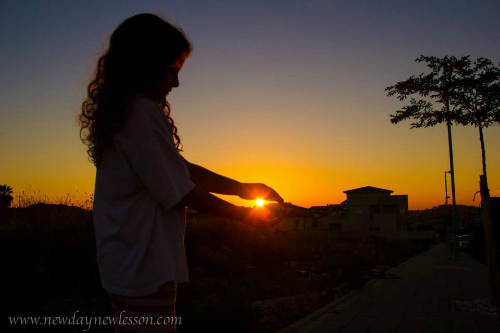

 Do you know who Dr Stella Ameyo Adadevoh is?
Do you know who Dr Stella Ameyo Adadevoh is?









 It was a late afternoon in June when Elizabeth Atalay and I, both fellows in Ethiopia with
It was a late afternoon in June when Elizabeth Atalay and I, both fellows in Ethiopia with 






